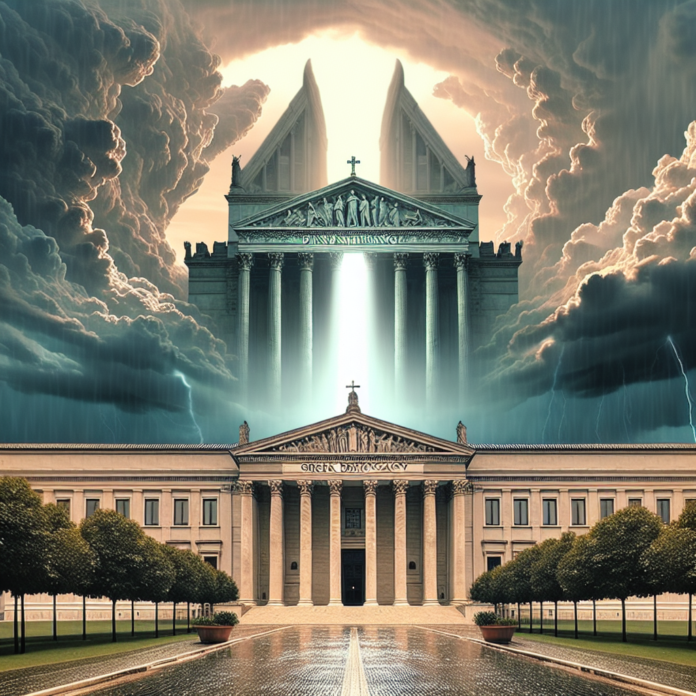Keeping Doctrine Away from Democracy: The Catholic Church’s Role in Politics
In the complex tapestry of global politics, few institutions have wielded as significant an influence over centuries as the Catholic Church. From the moral guidance it offers to millions of followers to its historical entanglements with temporal powers, the church’s role in shaping political landscapes cannot be understated. Yet, as democracies around the world continue their relentless march toward inclusivity and modernization, questions arise about the appropriate extent of religious doctrine’s inclusion in political discourse. A nuanced perspective suggests that a progressive outlook within the Catholic Church, as embodied by Pope Francis, provides a counterpoint to rigid traditionalism, potentially offering a more harmonious path forward for the interaction between faith and democracy.
Historically, the Catholic Church has been a formidable political player. During the Middle Ages, the church wielded enormous power, often crowning kings and swaying the policies of entire nations. The merger of religious and political power often resulted in authoritarianism justified by divine right, such as the era of the Papal States, which maintained political and naval power until the late 19th century. The intertwining of church and state during these centuries often curtailed civil liberties, contrasting starkly with the democratic values of today.
Enter Catholic conservatism, an ideology that seeks to hold fast to traditional doctrines, such as those surrounding the Latin Mass, which was standardized in the Tridentine era and remains a powerful symbol of Catholic orthodoxy. The traditionalists often argue from a perspective of purity, hoping to preserve a version of the church that provides objective truths in a rapidly secularizing world. Yet, in doing so, they risk alienating believers who yearn for a church that resonates with contemporary society, a society that increasingly values diversity, equality, and inclusivity—cornerstones of modern democracy.
Under the progressive guidance of Pope Francis, the Catholic Church has taken notable steps to adapt to a changing world while remaining true to its spiritual mission. Known for his humility and focus on social justice, Pope Francis represents a departure from the rigid dogmatism that has sometimes marked the church’s past. His emphasis on issues like climate change, economic inequality, and migration highlights the necessity for a church that engages with the real-world issues affecting its followers—as opposed to one that simply dictates from a centuries-old playbook.
One of the most striking examples of this progressive shift is Pope Francis’s approach to the Latin Mass. While acknowledging its historical significance, he emphasizes that it should not be elevated above the spirit of Vatican II, which sought to make the liturgy more accessible and participatory, a reforming wind that aligns the church more closely with democratic principles. By doing so, he subtly resists the allure of traditionalism that can ossify religious practice and create unnecessary schisms within the church.
Democracies thrive on pluralism—a plurality of ideas, voices, and beliefs that can coexist and blend, forming a tapestry stronger than its individual threads. An ecclesiastical conservatism that is unwavering in its adherence to traditionalisms like the Latin Mass, without regard for the evolving understandings of justice and inclusion, risks stifling the dialogue necessary for religions to contribute positively to democratic societies.
The impact of this progressive movement within the Catholic Church extends beyond the boundaries of faith communities. In democracies where the Catholic population is substantial, such as in Brazil, the Philippines, and parts of Europe, a church that engages in open dialogue and upholds values of compassion and inclusivity supports political systems that prioritize human dignity and worth above dogma. This is where Pope Francis’s progressive stance makes a powerful statement: the church must be a bridge between tradition and modernity, inspiring its followers to engage constructively in their communities and governments.
Even as the Catholic Church grapples with its role in politics and society, Pope Francis’s leadership suggests that a path to renewal hinges on embracing the progressive, the inclusive, and the humane. This approach acknowledges that while historical traditions form the foundation of any enduring institution, it is the willingness to engage with contemporary issues, from climate change to social inequality, that determines relevance in the modern world.
In conclusion, the Catholic Church stands at an intriguing crossroads. By steering away from doctrinaire politics and promoting a vision anchored in progressive values championed by Pope Francis, the church might not only rejuvenate its spiritual mission but also support democratic polities where liberty and equality flourish. Navigating this path may not be easy, but it is arguably essential for a future where faith and democracy coexist harmoniously, each enriching the other.
